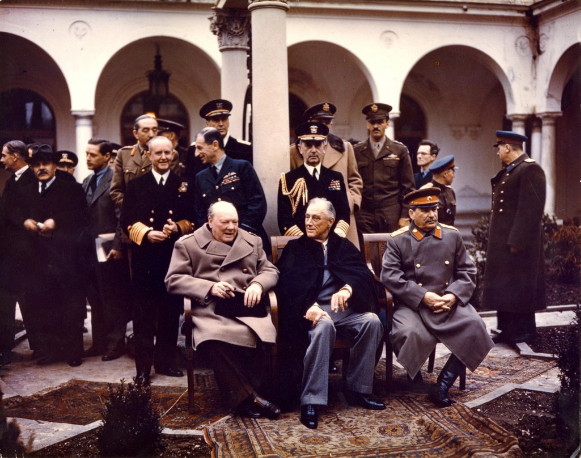Yalta Conference
Yalta Conference. The conference of the ‘Big Three’ Allied leaders held in Yalta, in the Crimea, on 4–11 February 1945. There F.D. Roosevelt, Winston Churchill, Joseph Stalin, and their foreign ministers, military chiefs of staff, and other advisers planned the final defeat of Nazi Germany and determined the political order of postwar Europe. Among the most important decisions reached were those concerning the dismemberment of Germany and Austria into military-occupation zones of the United States, Great Britain, France, and the Union of Soviet Socialist Republics; the reparations to be imposed on Germany; the prosecution of Nazi war criminals; the repatriation of American prisoners of war and displaced Soviet citizens (Ostarbeiter, prisoners of war, and collaborators with the Germans; see Displaced persons); Soviet entry into the war against Japan within three months after Germany's defeat (a top secret protocol); the redrawing of Poland's borders (ie, Poland's withdrawal east of the Curzon Line, with digressions in some areas of 5–8 km in Poland's favor, in exchange for the incorporation of Germany's eastern borderlands within Poland); the establishment of the Moscow-sponsored Polish Provisional Government of National Unity; the convocation of the United Nations Conference on International Organization in San Francisco on 25 April 1945; the admission of Soviet Ukraine and Belarus in addition to the USSR as members of the proposed UN General Assembly; and the principle of unanimity and veto in the UN Security Council.
The conference's ‘Declaration on Liberated Europe’ allowed the USSR to interpret broadly its ‘aid’ to the countries it ‘liberated’; the result was the Sovietization of Eastern Europe and the Cold War. Joseph Stalin and his advisers maximally exploited the Soviet military victories against Germany, the Soviet military occupation of most of Eastern Europe, and the need for Soviet participation in the war against Japan to gain an upper hand in the conference's decisions. Roosevelt yielded to most of the Soviet demands. Soviet historians have viewed the conference as the greatest success of Soviet foreign policy. It formally recognized the Soviet annexation of eastern Galicia and Volhynia and western Belarus (ie, half of prewar Poland's territory), sealed Eastern Europe's fate within the Soviet sphere of influence, and strengthened the position of the USSR in world politics.
BIBLIOGRAPHY
Stettinius, E.R. Roosevelt and the Russians: The Yalta Conference (New York 1949)
McNeill, W.H. America, Britain, and Russia: Their Co-operation and Conflict, 1941–1946 (Oxford 1953; repr, New York 1970)
Clemens, D.S. Yalta (New York 1970)
Iakovlev, A. (ed). Ialtinskaia konferentsiia 1945: Uroki istorii (Moscow 1985)
Vasyl Markus
[This article originally appeared in the Encyclopedia of Ukraine, vol. 5 (1993).]
